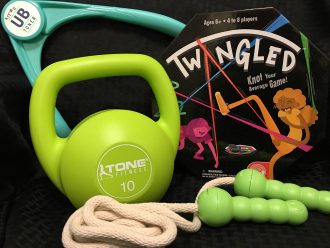Fitting Fitness into Library Programming
Libraries around the country have incorporated fitness into their collections and programming offerings, and these programs are often met with enthusiasm from patrons. However, it’s not always easy to get a fitness program off the ground.
One hurdle is liability. What happens if a program participant or user who checks out a fitness item gets injured? A liability waiver may suffice in some districts, but not others. Related, insurance can be another hurdle. “This can especially be a challenge for someone who is not a professional fitness instructor, but who does it as a hobby,” said Noah Lenstra, founder of Let’s Move in Libraries (letsmovelibraries.org). “I personally don’t think a volunteer instructor should be required to have this type of insurance coverage (it costs a TON) but many cities and counties require it.”1
In some places, getting a fitness program off the ground may be hampered by opinion – from library administration thinking fitness is outside the purview of the library, or from local businesses who feel that the library is undercutting their paid memberships. “One solution here would be to partner with the gyms/rec centers to offer a small sampling of programs at the library or to even check-out passes to gyms at the library, which I’ve seen a number places do,” Lenstra said.2
If bringing fitness to your library is a priority for you, there are many ways to work it into your collection or programming. Here are two examples of successful fitness programs that you may be able to replicate at your library:
In Shrewsbury, MA, not far from Boston and its annual marathon, the library hosted a program to help users reach a slightly easier goal — running a 5k. The Couch to 5k Runners Group met once a week at the Shrewsbury Public Library and twice a week at Marathon Sports, a local running store, to tackle an eight-week program to build up to running 3.1 miles in one go. Thirty people signed up to attend the first run, and eight eventually finished the program, including reference librarian Caitlin McKeon Staples, who organized the program.3 McKeon Staples set up the program with raffles and incentives including a Fitbit and other prizes, but found at the end of the program that many people had forgotten about the tangible prizes altogether. “My big takeaway is that people were excited just to have completed it,” McKeon Staples said.4 To stem any liability issues, McKeon Staples limited the program to older teens and adults, hoping that people would be able to judge that they could complete the program safely. She also modified a waiver form found at Let’s Move in Libraries (http://letsmovelibraries.org/wp-content/uploads/2018/05/ExamplesOfLiabilityForms.pdf) for participants to sign before the runs starting at the library, and Marathon Sports had participants sign a separate waiver for runs starting at the store.5
The Smyrna (GA) Public Library offers users a chance to get fit on their own schedule. The “Smyrna Strong” collection gives users access to novice-level fitness equipment including resistance bands, kettlebell weights, and hand weights; wellness items including food scales and body tape measurers; hiking packs with binoculars that can be used at nearby parks; and kids equipment including jump ropes and movement games like Twister.6 Mary Wallace Moore, the director of the Smyrna Public Library, has found that the bags check out extremely well when they are on display, but poorly when they are on regular shelving, so she and her staff try to incorporate items into their displays when possible.7 Moore took the liability issue to the City Attorney, who wrote a disclaimer that is posted on each kit in the collection and states that the patron accepts risks associated with use of the kit by checking out the kit.8
Visit Let’s Move in Libraries for more ideas around library fitness programming.
References
- Noah Lenstra, founder of Let’s Move in Libraries, in an email interview with the author, August 15, 2018.
- Ibid.
- Caitlin McKeon Staples, reference librarian at Shrewsbury Public Library, in a phone interview with the author, August 15, 2018.
- Ibid.
- Ibid.
- Mary Wallace Moore, library director at Smyrna Public Library, in an email interview with the author, August 13, 2018.
- Ibid.
- Ibid.








